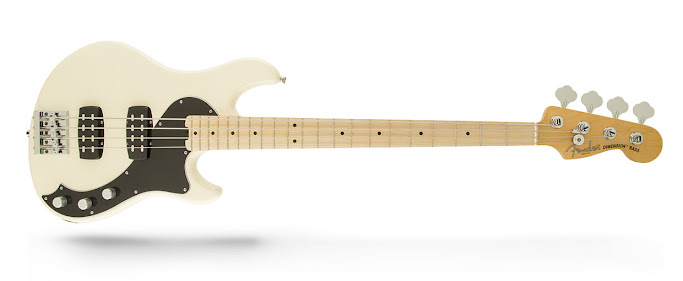Can Fender create another Dimension?
It is often said that musicians are sticking to their guns : Fender will be Fender, Gibson will be Gibson and Moog will be Moog. So why change? As you can notice on this blog, Fender has always been proposing alternatives to their main designs.
Fender decided to revamp its modern series to give it a second chance. So what went wrong (again)?
When you read critics on the forums, the bass players are unanimous: this bass series is a really good one. Good quality, good sound, modern but respecting the Fender sonic identity, solid, not to heavy.
It seems difficult nowadays to sell a kind of design that is related to other brands. MusicMan had been an evolution of Fender, G&L had been an evolution of MusicMan, so what the point for Fender of imitating its descendants? Ibanez had been good at producing a cheap alternative of the Stingray with the ATK
It seems the Dimension series is a kind of bass you buy because you are a serious Session musician or a hired gun, it wasn't really promoted by "cool" and "famous" bass players, its sound hasn't been identified by people eager to reproduce it, in a word, it never inspired people.
This is probably why Fender modern series are not sustainable, as of Gibson. These brands have a rich past and struggle to be identified as innovative (even if they really are) compared to Ibanez, Yamaha or Schecter. The paradox is they need to fail over and over again with modernity to make innovations desirable on vintage designs. The last American series of Precision and Jazz are a mix between the legendary past and all these innovations.
A real bet on modernity
Apart from the Precision and Jazz Bass, some succeeded in making their own way : the mustang as an example. The Fender Dimension Series released in 2013 should be considered as an attempt to renew the design and sound of Fender among the modern competitors (MusicMan, G&L, Ibanez) with an active electronic, new kinds of pickups, a lot of versatility. And they did with this series, produced in the USA, in Mexico and even in China, models for everyone, one pickup, two pickups, 4 strings, 5 strings, passive, active, you name it!A second thought after a failure
But wait! The Dimension series existed before? Yes, with a different body shape, more classical pickups and a not-that-Fender headstock, in 4 and 5 strings, with an active electronic between 2004 and 2007. Saying that the design was "neutral" and "tasteless" would be an understatement, lets be honest, if it had been made by a less know guitar maker, nobody would have paid attention!Is it still a Fender instrument?
Fender decided to revamp its modern series to give it a second chance. So what went wrong (again)?
When you read critics on the forums, the bass players are unanimous: this bass series is a really good one. Good quality, good sound, modern but respecting the Fender sonic identity, solid, not to heavy.
It seems difficult nowadays to sell a kind of design that is related to other brands. MusicMan had been an evolution of Fender, G&L had been an evolution of MusicMan, so what the point for Fender of imitating its descendants? Ibanez had been good at producing a cheap alternative of the Stingray with the ATK
It seems the Dimension series is a kind of bass you buy because you are a serious Session musician or a hired gun, it wasn't really promoted by "cool" and "famous" bass players, its sound hasn't been identified by people eager to reproduce it, in a word, it never inspired people.
This is probably why Fender modern series are not sustainable, as of Gibson. These brands have a rich past and struggle to be identified as innovative (even if they really are) compared to Ibanez, Yamaha or Schecter. The paradox is they need to fail over and over again with modernity to make innovations desirable on vintage designs. The last American series of Precision and Jazz are a mix between the legendary past and all these innovations.




Comments